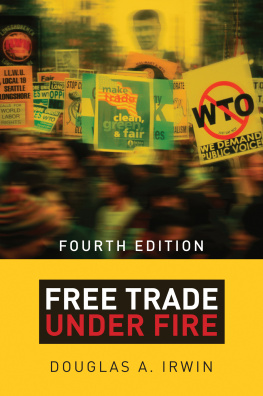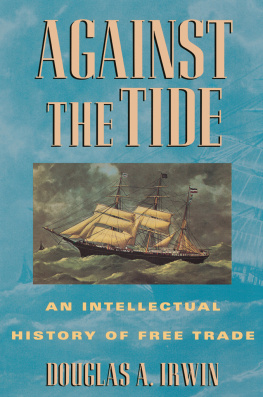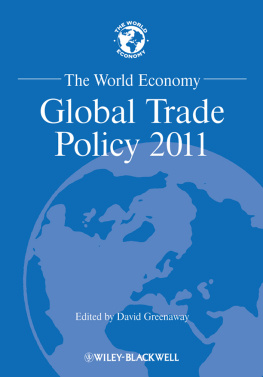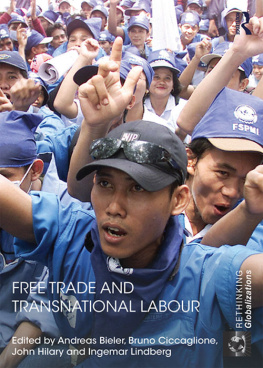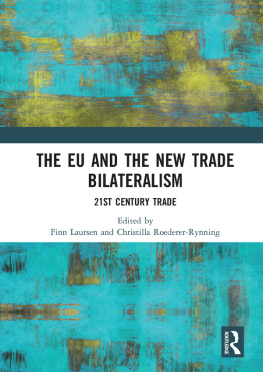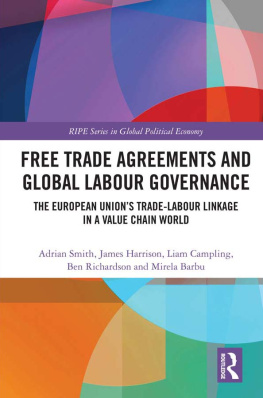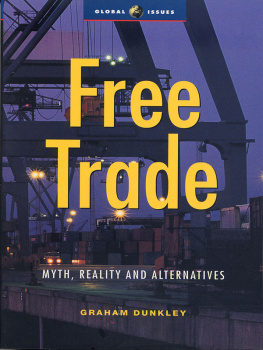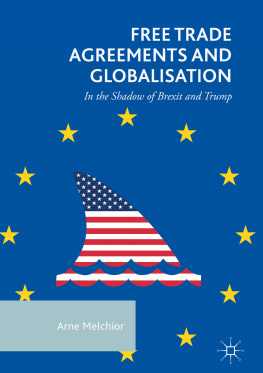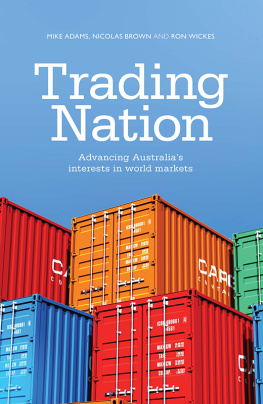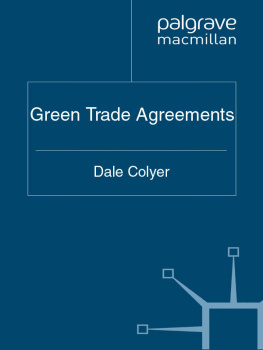
FREE TRADE
UNDER FIRE
Princeton University Press Princeton and Oxford
FREE TRADE
UNDER FIRE
FOURTH EDITION
DOUGLAS A. IRWIN
Copyright 2015 by Princeton University Press
Published by Princeton University Press, 41 William Street, Princeton, New Jersey 08540
In the United Kingdom: Princeton University Press, 6 Oxford Street, Woodstock, Oxfordshire OX20 1TW
press.princeton.edu
Cover photograph: Protestors demonstrate against the World Trade Organization gathering, Seattle, February 22, 2002. Christopher J. Morris/Corbis.
All Rights Reserved
Library of Congress Control Number 2015936929
ISBN 978-0-691-16625-4
British Library Cataloging-in-Publication Data is available
This book has been composed in ITC Garamond Light and Frutiger
Printed on acid-free paper.
Printed in the United States of America
10 9 8 7 6 5 4 3 2 1
___________FOR THE DARTMOUTH STUDENTS OF ECONOMICS 39
________Contents
________Figures
________Tables
________Preface
In his 2014 State of the Union address, President Barack Obama asked Congress to give his administration special authority to conclude agreements that would reduce trade barriers with the European Union and Pacific Rim countries. The next day Senate Majority leader Harry Reid, a Democrat from Nevada, announced his opposition to this request. I think everyone would be well advised just not to push this right now, he stated. A few days later, Nancy Pelosi, the Democratic minority leader in the House of Representatives, agreed, saying that the presidents request was out of the question.
In his 2015 State of the Union address, President Obama repeated his plea. Look, Im the first one to admit that past trade deals havent always lived up to the hype, he said, but 95 percent of the worlds customers live outside our borders, and we cant close ourselves off from those opportunities. Once again, Democrats in Congress demurred. Rep. Peter DeFazio (D-OR) said he couldnt support another job-killing, job-exporting free trade agreement identical to the ones pushed by [former Presidents Bill] Clinton and [George W.] Bush. These trade deals make it much easier for corporations to send American jobs overseas, complained Rep. Rosa DeLauro (D-CT). Why have top Democrats in Congress been so dismissive of a request coming from a Democratic president?
This episode was a simple reminder that trade policy always and inevitably generates controversy. Simply put, free trade is always under fire. These congressional leaders were simply warning, correctly, that new efforts to expand world trade would generate significant opposition in the House and Senate. That has always been the case, but the nature of the controversy and the arguments about trade have nevertheless changed over time.
This book aims to introduce the reader to some basic economic principles and empirical evidence regarding international trade and trade policy so that we can better understand this controversy. The first edition of this book was published in 2002, shortly after huge anti-globalization protests rocked Seattle during the 1999 World Trade Organization (WTO) meeting there. Protesters demonstrated against the WTO and its potential impact on national sovereignty and environmental regulations, but the anti-globalization movement all but disappeared after the terrorist attacks of September 11, 2001. Then, in the mid-2000s, the American public began to fear the offshoring of service-sector jobs to India and the loss of manufacturing jobs to China. Just as these fears were peaking, the global financial crisis of 2008 struck and the volume of world trade plummeted 12 percent in 2009. Economists and policymakers worried that the Great Recession could lead to a protectionist response like that seen during the Great Depression of the 1930s, but were surprised when trade policies remained relatively open. As world trade recovered, the issue of income inequality came to the forefront of public discussions. Consequently, the concern that trade with low-wage developing countries (such as China) has eroded the American middle class once again received attention.
This fourth edition of Free Trade under Fire has been updated to deal with a host of new developments, ranging from protectionism and the Great Recession to the latest evidence on trade, wages, and jobs. As noted in the first edition, this book draws upon the vast amount of economic research on international trade policy that lends insight into these issues. As before, I wish to acknowledge all of the scholars who have made contributions to this field in recent years. In addition to those mentioned in previous editions, I would particularly like to thank Chad Bown, Nina Pavcnik, and Robert Johnson for providing valuable advice on this edition. I am also indebted to Maha Malik, Andres Isaza, and Konrad von Moltke, my trustworthy Dartmouth research assistants, who helped with the preparation of this new edition. Thanks also go to Peter Dougherty and Seth Ditchik at Princeton University Press for their continued support of this ongoing project.
FREE TRADE
UNDER FIRE
Introduction
Free trade, one of the greatest blessings which a government can confer on a people, is in almost every country unpopular.
Thomas Babington Macaulay (1824)
Nearly two centuries after Macaulay made it, this observation by one of Britains great historians still rings true. Growing world trade has helped lift standards of living around the world, and yet today, as in Macaulays time, free trade does not win many popularity contests. Indeed, public opinion surveys in the United States and Europe reveal widespread skepticism about the benefits of international trade and trade agreements. Trade policy remains a highly controversial subject, a source of never-ending public debate.
In almost every country, international trade brings out anxieties and insecurities. With each passing decade, some of the old fears about trade recede and new ones take their place. In the 1980s, many Americans were convinced that Japan would achieve economic dominance by wiping out industry after industry in the United States, from automobiles to semiconductors to supercomputers, and thereby diminish Americas position in the world. Such concerns vanished by the early 1990s when Japan entered a prolonged economic slump. But in 1993 fears arose that the North American Free Trade Agreement (NAFTA) would result in a giant sucking sound of jobs lost to Mexico due to its low wages. (We owe this memorable phrase to Texas billionaire and 1992 presidential candidate Ross Perot, who was a leading anti-NAFTA activist.) Then, in 1999, the streets of Seattle were filled with large protests against the World Trade Organization (WTO) for its promotion of free trade and alleged indifference to the worlds workers and environment. Today, few Americans view Mexico as an economic threat or know or care about what the WTO does.
In the first decade of the twenty-first century, concern shifted to China. China has become a goliath in the production of manufactured goods, andit is often arguedresponsible for huge job losses in the United
These fears of trade exist in good times and in bad. The 1990s were a period of robust economic growth and the lowest U.S. unemployment in thirty years, yet NAFTA and actions taken by the WTO generated heated debates. And economic downturns invariably continue to bring out cries that foreign countries are stealing our jobs and therefore protectionist trade policies are required to protect American workers and the industries that employ them.
Next page
